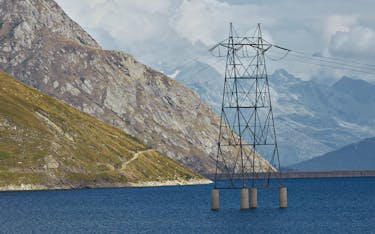
The Court of Justice of the European Union (CJEU) has ruled in favour of Swissgrid in the proceedings concerning participation in the TERRE control energy platform. Although the legal dispute is still ongoing, the judgement confirms that even companies from third countries have a right to be heard if they are sufficiently affected by a decision. Mike Schmid, General Counsel at Swissgrid, clarifies the decision.
Mike, what exactly did the Court of Justice of the European Union decide?
Mike Schmid: Let's start with some context. We are defending ourselves against a decision by the European Commission that would have excluded us from participating in TERRE. The CJEU has now overturned a judgement by the lower court – the General Court of the European Union (EGC) – and sent it back to the General Court for reassessment. The EGC did not even acknowledge our complaint, on the grounds that the Commission's letter was an ordinary letter without legal effect and that Swissgrid was therefore not entitled to institute proceedings against it. The CJEU has now overturned this decision not to intervene. Although it has not yet been decided whether we can continue to participate in TERRE or in the other platforms (MARI, PICASSO) in the future, the EU court must now examine the substance of the case for the first time.
This means that no final decision has yet been made regarding Swissgrid’s participation in TERRE. What does the judgement mean in practice?
The judgement is a partial victory, but an important one. The lower court must now examine whether the EU Commission violated EU law with its actions and whether its letter must therefore be declared null and void. We are optimistic about the future. The CJEU's judgement sends out an important signal: even companies from third countries have a fundamental right to be heard in the EU if they are negatively affected by the actions of EU authorities. This applies even if the complaint is directed against the European Commission. Even the European Commission cannot circumvent legal protection for affected third countries by acting under the threshold for applying formal decision-making procedures. The CJEU’s decision is at odds with the view of certain interest groups in Switzerland regarding the role of the Court of Justice in settling disputes with the EU, particularly in connection with existing and new bilateral agreements, including an electricity agreement.
There are other legal proceedings in progress in connection with European control energy platforms. Where do we stand?
Yes, in addition to the TERRE proceedings, Swissgrid is also defending itself against non-participation or exclusion from the MARI and PICASSO platforms and Imbalance Netting (IGCC). We have brought an action against the European Union Agency for the Cooperation of Energy Regulators (ACER). Ultimately, our goal is to fulfil our legal mandate – the secure operation of the transmission grid – as effectively as possible. An electricity agreement with the EU would make all these proceedings superfluous. It would create legal certainty and allow us to officially participate and have a say in these platforms, which are essential for grid stability.




